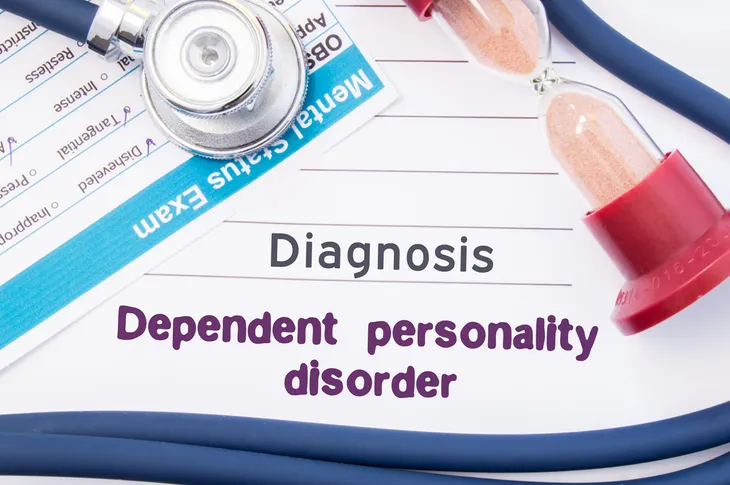Have you ever wondered why a close friend or family member seemed so concerned with the opinions, attitudes or outlooks of someone close to them, such as a parent or partner? It’s possible this person was struggling with dependent personality disorder, or DPD, which is commonly described as a disorder in which someone has an excessive need to be taken care of that leads to submissive and clinging behavior.
Dependent personality disorder can be found in just about anyone — though it most often emerges in young adults, it can occur at any age and tends to affect men and women equally. It can be quite problematic, however, as it can lead an individual to make decisions that benefit others while negatively affecting their own physical or mental well-being. That’s why it’s important to know the symptoms of DPD.
Appearing Needy
An individual with dependent personality disorder will often appear needy, particularly when in the presence of the person on whom they depend. This behavior can be apparent in a wide range of ways, but is particularly clear when the individual needs to make an important decision. In many cases, the person with dependent personality disorder will make a decision that benefits the person they are dependent upon more than themselves.
Depending on the nature of the decision and its importance, this can further intensify the individual’s dependence on someone else. In time, this could lead them to give up all attempts at decision making, leaving someone else to make the majority of the choices for them.
Separation Anxiety
It’s one thing to feel anxious when someone close to you goes away for a few weeks or months. It’s another thing to feel completely lost in the world just because that person is absent for a few days or hours. Struggling to deal with the absence of someone else over such a short period of time can be a symptom of dependent personality disorder.
In cases where DPD has become a problem, the afflicted individual may be unable to focus on anything but the missing person until their return. This could make them less effective at their job, managing personal hygiene, or looking after relationships with friends and family.
Struggling with Choices
An individual with dependent personality disorder will struggle to make decisions without the input of the person they have become dependent upon. At first, this may be limited to major decisions, such as where to attend college or which car to buy. Eventually, however, the problem could affect rudimentary and everyday decisions, from what to eat for dinner to what to wear to work.
If you depend on the input of another individual to make such decisions, there’s a chance you have developed dependent personality disorder. It may be time to evaluate how this relationship affects your overall health and well-being and to discuss the matter with a mental health professional.
Poor Decision-Making
Being unable to make firm choices about major or minor matters is one thing; it’s something else to consistently make decisions that hurt your own well-being in order to satisfy the wishes of someone else. In many cases of dependent personality disorder people will put their own interests far behind those of another individual, a position that can lead them into serious trouble with their mental and physical health.
If you are concerned that someone you know has developed dependent personality disorder, consider if that person consistently makes decisions that clearly hurt themselves while benefiting someone else. This could involve giving the person on whom they are dependent money for rent or luxury purchases, such as trips, jewelry, etc., without receiving anything in return.
Shutting Others Out
One major symptom of dependent personality disorder, or DPD, is focusing all of one’s attention on a single other individual while distancing themselves from other friends, family and colleagues. This could lead a person to progressively restrict access to people they were once close to in order to provide more attention to the individual on whom they have become dependent.
In essence, an individual with dependent personality disorder may become a shut-in, only leaving the home for work or events they attend alongside the person they’ve become dependent upon. This kind of behavior can become detrimental if it means cutting most or all ties to the people who care about the individual, such as friends and family members.
Avoidance of Responsibilities
Imagine having a close friend or family member who thrives in social situations and, in connection with these strengths, goes into a career in politics. Because this person can quickly develop positive connections with people, they excel in their career by attending many day and evening functions related to their job.
Now imagine that this person meets someone who discourages this kind of behavior. In response, the person stops attending the events that made them so successful in their career. Over time, their willingness to go above and beyond for their career fades away, to the point where they may no longer carry out the basic requirements of their position, putting their very employment in danger. This is one example of someone who may be struggling with dependent personality disorder.
Devastation When Relationship Ends
An individual with dependent personality disorder can come to feel that their value is dependent upon their relationship with one other person. In time, this can make them pass up opportunities that benefit themselves but do not clearly help the person on whom they are dependent. It may even lead them to pursue decisions that clearly hurt their interests but marginally benefit someone else.
In this kind of situation, the end of the relationship connecting these people can have absolutely devastating effects on the individual with dependent personality disorder. It may take months or even years for them to see that they have value outside of the previous relationship. To reach this conclusion, the individual may require temporary or even permanent counselling from a social worker or psychiatrist.
Tolerance for Mistreatment
Every relationship is different. Some people prefer to be in a relationship where each person holds a relatively even amount of control over decisions both major and minor. Others, however, gravitate towards relationships where one person tends to make most of the decisions that affect both individuals equally.
Both types of relationships can work, so long as each person within the relationship is happy. However, in neither case should one person mistreat the other, either physically or verbally. Abuse of any kind should be considered unacceptable, but it may not be viewed that way where one person in the relationship suffers from dependent personality disorder. In fact, allowing a partner to consistently mistreat them without consequence is a visible sign of DPD.











